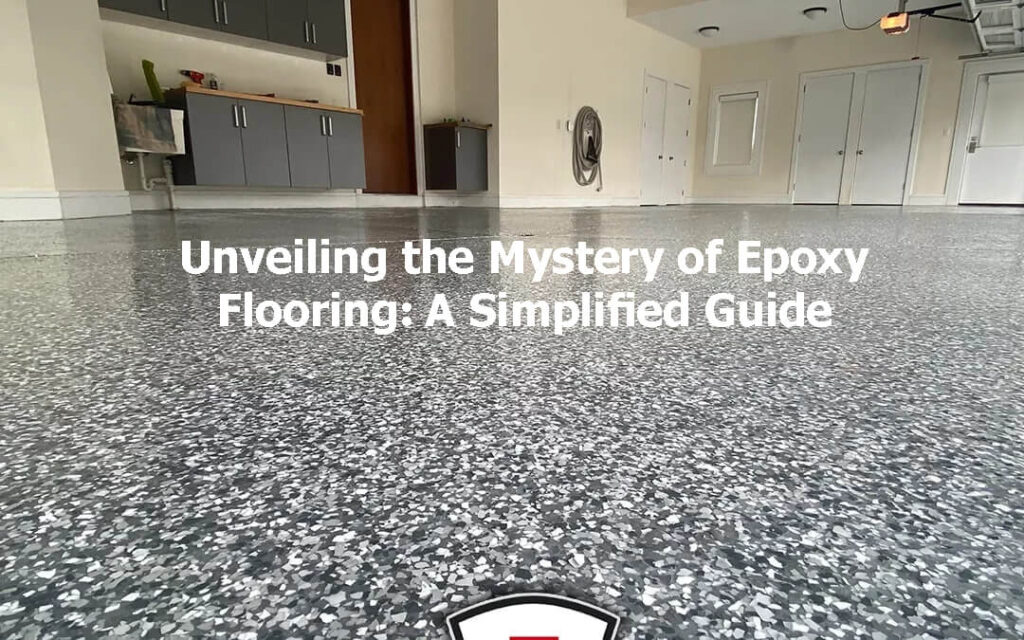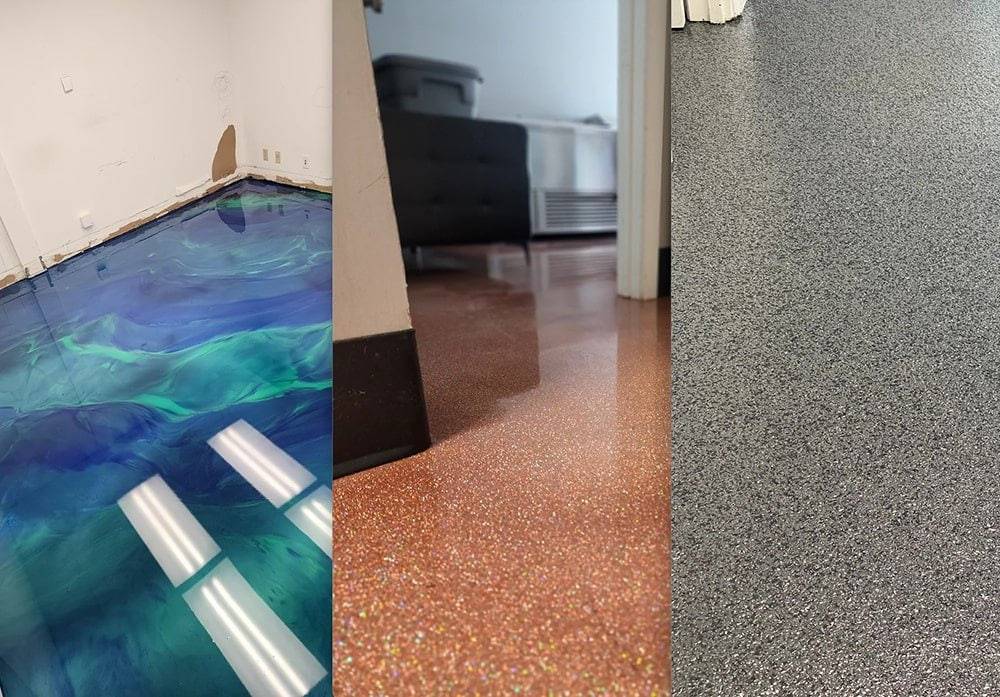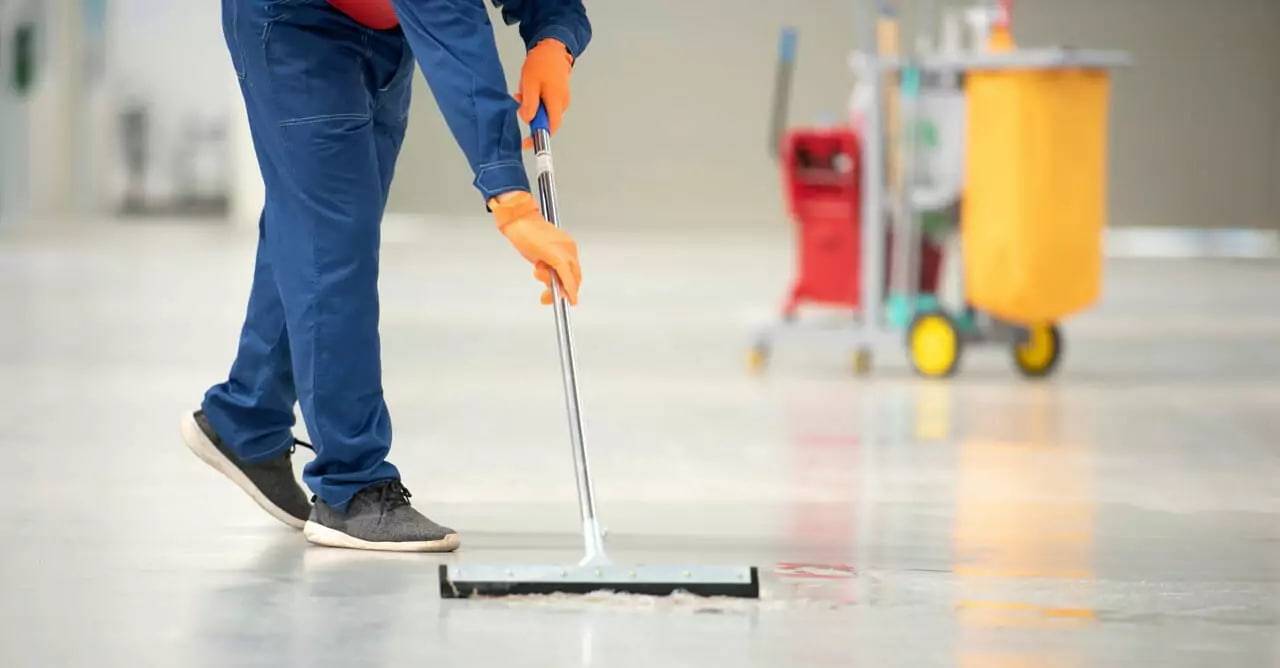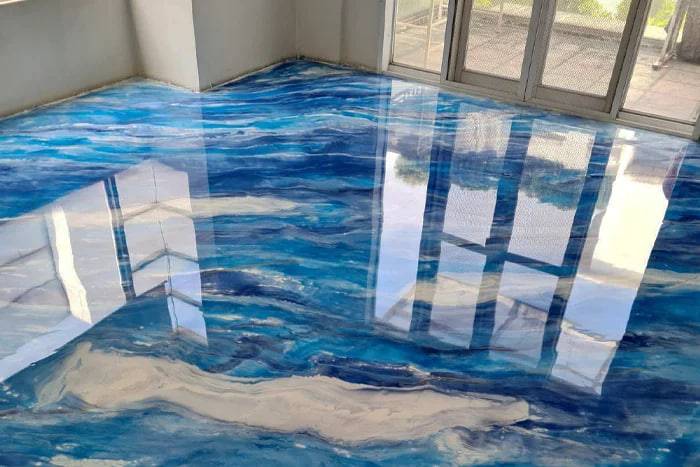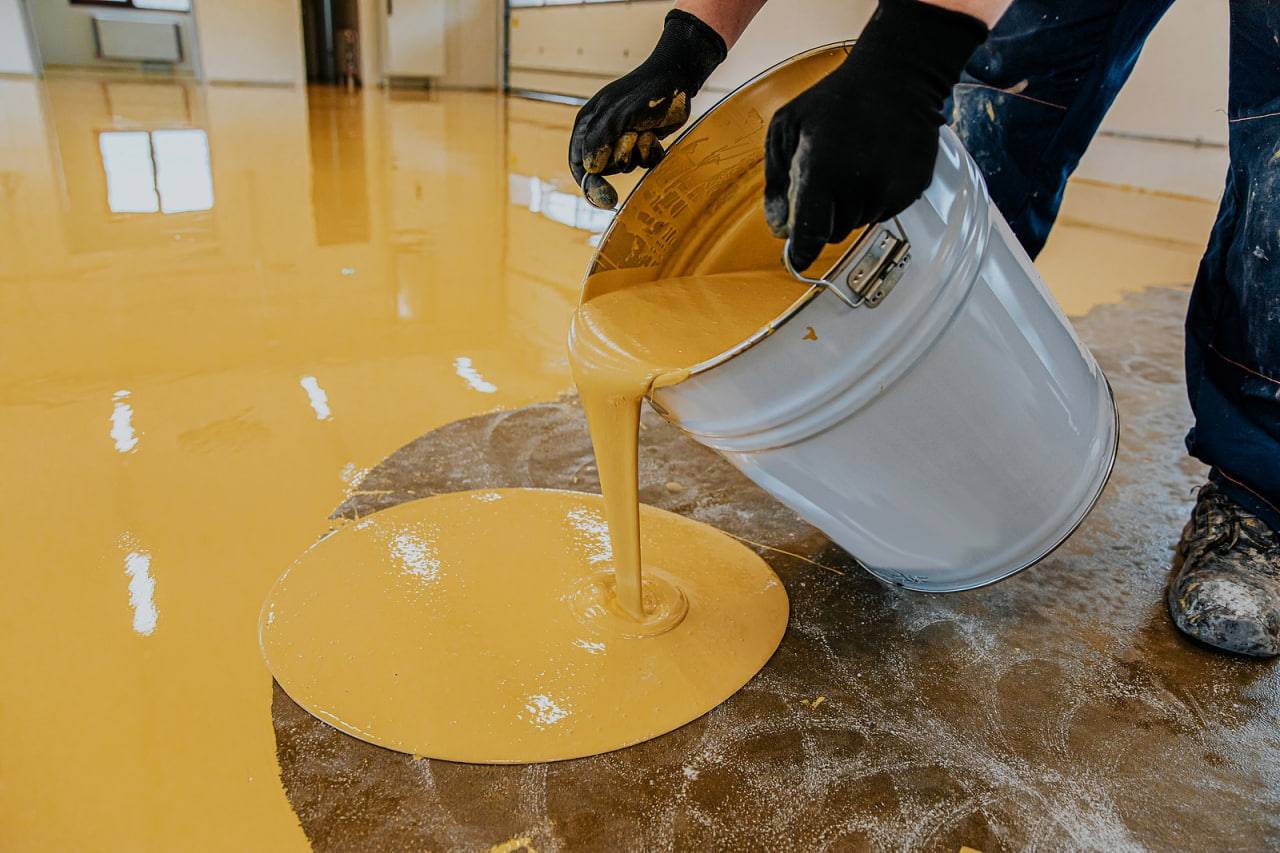Imagine a durable, decorative shield for your concrete floors. That’s what epoxy flooring offers, thanks to its unique blend of synthetic resins. These resins are applied in layers, creating a seamless, protective barrier that’s both beautiful and tough.
Why Epoxy?
- Strength and Resilience: Epoxy floors handle heavy traffic and chemicals with ease, making them ideal for garages, basements, and even industrial settings.
- Cleaning Breeze: Forget stubborn stains and dust bunnies! Epoxy’s non-porous surface makes cleaning a breeze.
- Style with Substance: Choose from a vast array of colors, finishes, and textures to express your unique style. Get creative with designs and patterns too!
- Safety First: Slip-resistant options ensure extra peace of mind in areas prone to spills.
- Moisture & Chemical Shield: Rest assured, epoxy floors repel water and many chemicals, protecting your concrete base.
But before you dive in, let’s address some important points:
- Cost: Compared to some flooring options, epoxy can be pricier.
- Installation: Professional installation adds to the cost.
- Fumes: Certain products emit fumes during installation, requiring proper ventilation.
- Slipperiness: While slip-resistant options exist, wet epoxy floors can still be slippery.
Ultimately, epoxy flooring offers a compelling combination of aesthetics, durability, and functionality. If you seek a long-lasting, low-maintenance, and stylish solution for your floors, epoxy is definitely worth considering.
Types of Epoxy Flooring
Epoxy flooring is a popular choice for both residential and commercial applications due to its durability, strength, and versatility. It comes in a wide variety of types, each with its own unique properties and benefits. Here are some of the most common types of epoxy flooring:
- Epoxy Mortar Flooring: This type of epoxy flooring is the most durable and is made with 100% solid epoxies and graded sand. It is ideal for high-traffic areas and can withstand significant impact.
- Epoxy Flake Flooring: This type of epoxy flooring is made with colored flakes that are scattered throughout the coating. It is a popular choice for decorative applications and can be used to hide imperfections in the subfloor.
- Epoxy Self-Leveling Flooring: This type of epoxy flooring is self-leveling, which means that it creates a smooth, seamless finish. It is ideal for uneven surfaces and can be used to create a variety of decorative effects.
- Metallic Epoxy Flooring: This type of epoxy flooring is made with metallic pigments that create a shimmering, reflective finish. It is a popular choice for high-end residential and commercial applications.
- Quartz-Filled Epoxy Flooring: This type of epoxy flooring is made with quartz aggregates that provide added strength and durability. It is ideal for areas that are exposed to heavy traffic or chemicals.
- Polyaspartic Epoxy Flooring: This type of epoxy flooring is a newer type of epoxy that is more durable and cures faster than traditional epoxy. It is a good choice for high-traffic areas or areas that need to be used quickly after installation.
Advantages of Epoxy Flooring
Epoxy flooring offers a wide range of benefits and advantages, making it a popular choice for both residential and commercial applications. Here are some of the key points to consider:
Durability and Toughness:
- Extreme resistance: Epoxy is highly resistant to wear and tear, chemicals, scratches, abrasions, impacts, and even extreme temperatures. This makes it ideal for high-traffic areas, garages, workshops, industrial settings, and more.
- Long-lasting: When properly installed and maintained, an epoxy floor can last for years, even decades, without needing replacement. This translates to long-term cost savings compared to other flooring options.
Easy Maintenance and Cleaning:
- Smooth and seamless: Epoxy creates a non-porous and seamless surface, making it easy to clean and sweep. Dirt, dust, and debris don’t easily stick, and spills can be wiped up quickly with minimal effort.
- Hygiene and sanitation: Epoxy’s resistance to bacteria and mold growth makes it suitable for areas requiring high hygiene standards, like food processing plants, hospitals, and laboratories.
Aesthetics and Customization:
- Visually appealing: Epoxy floors come in a wide variety of colors, patterns, and finishes, allowing for customization and design flexibility. They can enhance the aesthetics of any space, from industrial chic to modern and sleek.
- Reflective properties: Epoxy’s high gloss finish can improve light reflection, making spaces brighter and more visually appealing.
Other Advantages:
- Cost-effective: While the initial installation cost might be higher than some other flooring options, the durability, low maintenance, and long lifespan of epoxy floors can make it a cost-effective choice in the long run.
- Safety: Certain epoxy coatings can be formulated with non-slip additives, improving safety in areas prone to spills or moisture.
- Versatility: Epoxy can be applied to various surfaces, including concrete, wood, and tile, making it a versatile flooring solution for different applications.
Things to Consider:
- Installation process: Applying epoxy flooring requires proper preparation and expertise. Hiring a professional installer is recommended for optimal results.
- Potential for slipperiness: Although slip-resistant additives can be used, some epoxy finishes can be slippery when wet. Consider the specific needs of your space and choose the appropriate coating.
- Fumes and VOCs: Some epoxy products emit fumes and VOCs during installation. Ensure proper ventilation and follow safety precautions.
Beware of Resin Floor Failures and Mishaps
While epoxy flooring offers numerous benefits, improper installation can lead to significant problems and headaches down the line. Here are some unwanted results of a poorly installed resin floor system:
Failures and Damage:
- Delamination: This occurs when the resin coating separates from the underlying substrate, causing chipping, peeling, and cracks. This is often due to inadequate surface preparation, like failing to remove dirt, grease, or moisture before application.
- Air bubbles and blisters: Trapped air or moisture can create unsightly bubbles and blisters, compromising the floor’s integrity and aesthetics. This can happen due to improper mixing, high humidity, or applying the coating too thick.
- Unevenness and imperfections: Poor application technique can lead to uneven surfaces, bumps, dips, or roller marks, affecting the floor’s functionality and appearance.
- Chemical and mechanical damage: Improperly cured or formulated resins might be more susceptible to damage from chemicals, impacts, or abrasion, reducing the floor’s durability.
Safety Hazards:
- Slipperiness: Some resins, especially when wet, can be very slippery, increasing the risk of slips and falls. Choosing the wrong resin or failing to add slip-resistant additives can create a safety hazard.
- Fumes and VOCs: Improper ventilation during installation can expose workers and occupants to harmful fumes and volatile organic compounds (VOCs) emitted by some resins.
Additional Issues:
- Increased costs: Repairing or replacing a poorly installed floor can be expensive, negating the potential cost-effectiveness of epoxy flooring.
- Delays and downtime: Floor failure and repairs can lead to project delays and disruption to business operations.
- Aesthetic dissatisfaction: An uneven, poorly finished floor can detract from the space’s aesthetics and functionality.
Avoiding Mishaps:
To prevent these unwanted results, it’s crucial to:
- Hire qualified professionals: Choose experienced and certified installers who understand proper procedures and safety protocols.
- Ensure proper surface preparation: The substrate must be clean, dry, and free of contaminants for optimal adhesion.
- Select the right resin type: Different resins have different properties and are suited for specific applications. Choose the one that matches your needs and environment.
- Follow proper mixing and application techniques: Precise mixing ratios and application methods are crucial for achieving a successful outcome.
- Maintain proper ventilation: Ensure adequate ventilation during and after installation to minimize exposure to fumes and VOCs.
By choosing qualified professionals and following proper installation procedures, you can ensure your resin floor delivers its promised benefits and avoids the pitfalls of poor installation.
Here’s a rewritten paragraph about the cost of epoxy flooring:
Understanding Epoxy Flooring Costs:
Pinpointing the exact cost of an epoxy floor is tricky, as several factors play a role. From the size and layout of your space to the chosen design and specific type of epoxy, each project is unique. However, it’s important to consider both initial material and installation costs alongside the long-term advantages.
While the upfront investment might seem higher than some flooring options, epoxy floors often shine in the long run thanks to their exceptional durability and low maintenance needs. This translates to significant cost savings over time, making them a worthwhile investment for many applications.
To get a truly accurate quote tailored to your specific needs, it’s best to reach out to experienced professionals. At Dex Flooring, we work with a network of approved applicators who can provide detailed project quotations, ensuring you get the best value for your epoxy flooring project.
Here’s the rewritten paragraph:
Ready to transform your industrial or commercial space?
Epoxy flooring offers the perfect blend of stunning aesthetics and exceptional performance. Dive into Dex Flooring‘s diverse range of resin flooring products, where you’ll find solutions individually crafted from epoxy, polyurethane, or methyl methacrylate resins. Each system boasts unique advantages, perfectly suited to specific work environments. Whether you’re tackling a demanding industrial setting or a design-forward commercial project, Dex Flooring‘s flooring expertise awaits. Contact us today to discuss your vision and discover the perfect resin solution for your needs.
Epoxy Flooring FAQs:
What is epoxy flooring and how does it work?
Epoxy flooring is a type of coating made from synthetic resins applied in layers to concrete. It creates a seamless, protective barrier that’s both beautiful and tough.
Why choose epoxy flooring?
Strength & resilience, easy cleaning, stylish options, slip-resistant options, moisture & chemical resistance.
What are the downsides of epoxy flooring?
Higher initial cost, professional installation needed, fumes during installation, potential slipperiness.
Is epoxy flooring right for me?
Consider your budget, needs for durability, ease of maintenance, and desired aesthetics.
What are the different types of epoxy flooring?
Epoxy mortar, flake, self-leveling, metallic, quartz-filled, polyaspartic (each with unique properties & benefits).
How much does epoxy flooring cost?
Depends on size, design, type of epoxy, and installation. Consider long-term savings from durability & low maintenance. Consult professionals for accurate quotes.
How is epoxy flooring installed?
Requires proper preparation & expertise. Hire professionals for optimal results.
How do I maintain epoxy flooring?
Easy to clean with regular sweeping & mopping. Choose durable & low-maintenance options.
Is epoxy flooring slippery?
Choose slip-resistant options for wet areas. Be mindful of potential slipperiness when wet.
What are the safety concerns with epoxy flooring?
Proper ventilation is crucial during installation to avoid fumes & VOCs. Choose safe & low-VOC options.

